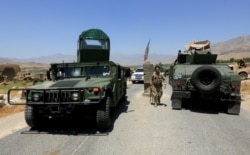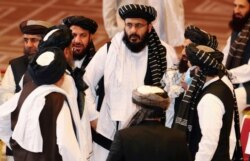A Taliban delegation in Moscow said Friday that the group would not attack provincial capitals even as news emerged that Taliban militants had attacked the capital of Afghanistan’s Kandahar province.
Kandahar’s police force said it had received reinforcements and was able to repulse the attack.
At a press conference in Moscow broadcast live by Afghan TV, Shahabuddin Delawar, the leader of the Taliban delegation, said the group had decided to avoid attacking cities to prevent bloodshed.
Taliban spokesman Zabiullah Mujahid told VOA the moratorium on attacking the cities was temporary.
Focus is districts
“In this regard, all I can say is that in the current first phase, the focus is on the districts. We will make a second plan for the cities, God willing,” he said via WhatsApp.
Mujahid told VOA the reason for the bifurcation was to protect the population and the infrastructure from destruction.
“Cities have people’s investments, shops, banks and other important things. Before the attack, we need to plan on how to secure them and save them from looting,” he said.
Kabul-based analyst Faiz Zaland said the Taliban “really want to give a chance to peace, to intra-Afghan [negotiations]. They want a political solution.”
But he said the Taliban would not wait long and predicted that if things did not begin to move on the negotiation front, they would start attacking the cities in a few months.
In recent weeks, Taliban forces have attacked or encircled multiple provincial capitals. One of them is Faizabad, the capital of Badakhshan province. Once home to Taliban archrival Ahmed Shah Masood’s forces, the province, which borders China, Tajikistan and Pakistan, has been nearly overrun by the Taliban.
Similarly, Qala e Naw, the capital of Badghis province, which was attacked Wednesday, was cleared of Taliban fighters Thursday. During the attack, the Taliban managed to break into the city’s prison and release hundreds of inmates.
However, while the Taliban have made swift gains in rural areas since the withdrawal of most foreign troops, they have been unable to completely overrun a city. Most attacks on cities have been repelled within a few hours or days.
Meanwhile, the Taliban delegation in Moscow said the border crossings the group recently captured would remain open and all trade would continue as usual.
Concern about instability
Russia said that it had expressed concern after fighting on the Afghanistan-Tajikistan border led to more than 1,000 Afghan troops seeking shelter in Tajikistan.
Russia considers Central Asia its backyard and has long expressed concern that instability in the region could help Islamic State’s local branch make inroads among the Muslim population that lives in those countries.
“We will take all measures so that Daesh [IS] will not operate on Afghan territory,” Delawar said during the press conference. “Our territory will never be used against our neighbors.”
The swift Taliban gains have led many to question how long the Afghan government can withstand an onslaught by the Taliban.
Peace negotiations in Doha have stalled and other efforts to jump-start them, including a meeting this week between Taliban and Afghan government representatives in Tehran, have so far been slow to yield results.
U.S. President Joe Biden has called it “highly unlikely” that the Taliban could capture Kabul, although he has put the onus of success on the Afghan political elite.
'They have the capacity'
“The Afghan government and leadership has to come together. They clearly have the capacity to sustain the government in place. The question is: Will they generate the kind of cohesion to do it? It's not a question of whether they have the capacity. They have the capacity. They have the forces. They have the equipment. The question is: Will they do it?” Biden said during remarks at the White House on Thursday.
He also seemed to hint that the solution to Afghanistan’s problems was in dividing territory into spheres of influence.
"[T]he likelihood there's going to be one unified government in Afghanistan controlling the whole country is highly unlikely,” he said, adding later that “never has Afghanistan been a united country, not in all of its history.”
This report includes information from Reuters.






